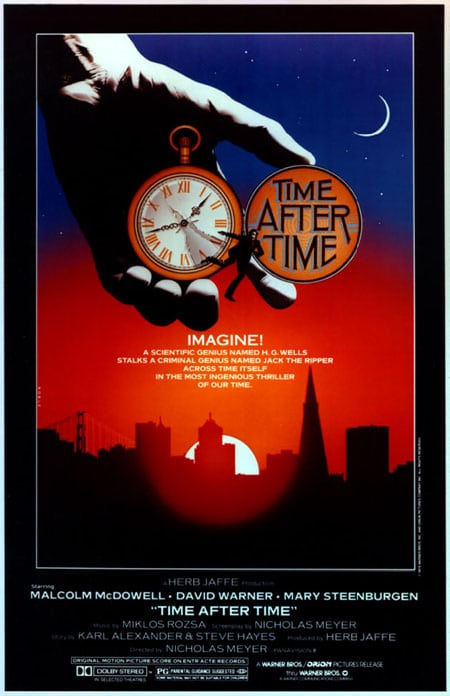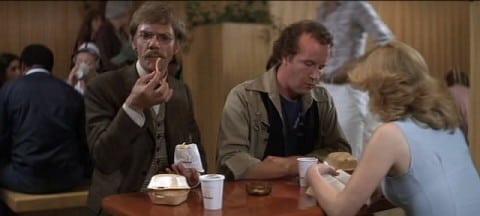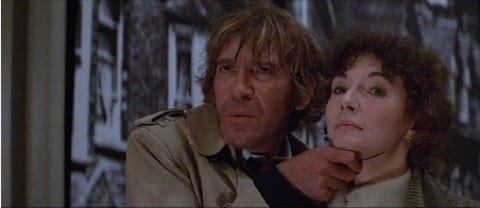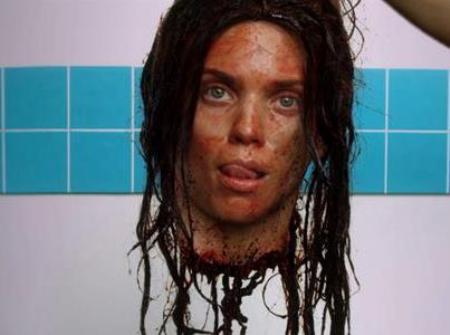Time After Time (1979)
Directed by: Nicholas Meyer
Written by: Karl Alexander, Nicholas Meyer
Starring: Charles Cioffi, David Warner, Malcolm McDowell, Mary Steenburgen
HCF REWIND NO. 224: TIME AFTER TIME [US 1979]
AVAILABLE ON DVD
RUNNING TIME: 112 min
REVIEWED BY: Dr Lenera, Official HCF Critic
1893 London. Jack the Ripper slays his latest victim. Meanwhile, writer Herbert George Wells displays a time machine to his skeptical dinner guests. Police constables arrive at the house searching for Jack, a bag with blood-stained gloves revealing the Ripper to be one of Herbert’s guests and friends, a surgeon named John Leslie Stevenson. Herbert races to his laboratory, but the time machine is gone. John has escaped to the future, but because he does not have the machine’s “non-return” key, the machine automatically returns to 1893. John uses it to pursue Stevenson to November 5, 1979, where the machine has ended up on display at a museum in San Francisco….
Time After Time is one of my favourite time travel pictures, and I would almost put it on a par with The Time Machine, The Terminator and Back To The Future in terms of films dealing with the subject, though, while it has amassed a large number of fans over the years, it’s not nearly as well known generally as I think it should be. It’s one of those films that successfully manages to traverse genres – science-fiction, suspense thriller, comedy, romance and social commentary [and possibly horror movie too], and, while it sometimes seems a little awkward mainly due to the fact that it was Nicholas Meyer’s first job of direction, it also has immense charm and even sweetness while not allowing those aspects to overwhelm the darker aspects. Of course there are certain inconsistencies, but you could say that about nearly all time travel films, the very concept not being possible….or is it?
Meyer wrote a novel called The Seven-Percent-Solution which was made into a film in 1976. It had Sherlock Holmes encounter Sigmund Freud, and inspired writer Karl Alexander to try a similarly inspired conceit and mix H.G.Wells, the writer of The War Of The Worlds and The Time Machine, amongst others, with Jack the Ripper. His novel was never finished but was adapted by Meyer into his screenplay. Richard Dreyfuss, Edward Fox and Sally Field were Warner Bros.’ first choices for the roles eventually essayed by Malcolm McDowell, Mary Steenburgen and David Warner. McDowell listened to recordings of H.G.Wells’ voice but decided not to try and sound like him as he felt that the high-pitched cockney may not have sounded too good on screen. Meyer removed several scenes which he thought were poorly staged, though there doesn’t seem to be any information on what the scenes were. Warners wanted to replace the old-fashioned [which is what Meyer wanted] score by the great Miklos Rozsa [Ben Hur, Spellbound] with a more contemporary one by Bill Conti, so Meyer took out a full-page ad in Variety thanking and congratulating him on his score. The film seemed destined to be a huge hit, but you can’t always predict what will and what won’t be popular, and Time After Time didn’t do very well at all until it came out on video. I always felt that Meyer, despite making two good Star Trek films, never really fulfilled the promise he showed as a filmmaker with Time After Time.
The film begins with a superbly handled Ripper murder scene which in a way wrong-foots the viewer leading him or her to think Time After Time is going to be a lurid,grisly slasher-type movie. The camera adopts the point of view of Jack as he approaches a tipsy prostitute stumbling around in the London fog. He appears to be another customer to her, and begins to have sex with her against the wall [all the time the camera maintaining the killer’s point of view], until we here a horrible noise of something being ripped apart, the noise probably being as horrific as anything we could have been shown. The camera pulls back to show her stomach gruesomely cut open. Very well done, and as iconic a Ripper scene as there is. For a while after Time After Time plays rather like The Time Machine, only the machine itself, a rather ugly though perhaps more practical [this one actually has a roof] thing, looks far less impressive and the travel though time isn’t so well done, the usual wispy visuals and words from some of the major events of the 20th century. It’s still not bad though, and this film isn’t at all a special effects fest anyway. It’s never explained why Herbert travels from London to San Francisco though.
Herbert has the expected trouble adjusting to 1979, and there’s the usual fish out of water suff [the highlight perhaps being where he enjoys a McDonald’s and later refers to it as a “that Scottish place” called “McDougal’s”] though he finds Jack amazingly quickly, and soon also finds himself with a modern woman who is far more forward and liberated than he’s used to, despite him having been all for free love and women’s lib in Victorian times. McDowell and Steenburgen got together during the film and got married soon after, so they have great chemistry as well as having fun with moments like Herbert worrying that he’s compromising and even forcing Amy to do something against her will, and she replying: “Forcing me? My God, Herbert, I’m practically raping you”. The story moves quite slowly by modern standards, but good editing makes us never forget that Jack is about, and the film gets almost uncomfortably suspenseful when Amy becomes in danger. Meyer’s inexperience shows in a foot chase which seems to be missing shots and virtually relies on Rozsa’s pulsating music to make it exciting, but later on we get a novel car chase where the hero doesn’t really know what he’s doing, and there are some superbly shot and edited moments to compensate, like Jack slashing a victim’s throat with a razor and the camera spinning round to show a drop of blood splashing onto Jack’s face and Jack glowering almost orgasmically, a particularly good scene for Warner’s Ripper.
There’s the odd touch of sloppiness, like the Ripper’s watch tune, The Spinner from Chants d’Auvergne arranged by Joseph Canteloube, being one that probably wouldn’t have been known till way after the Victorian Age, and a Laura-like plot twist near the end, which was used in a certain later Ripper movie, doesn’t come as any surprise, but the script, which Meyer peppers with Sherlock Holmes references [like Herbert’s landlady being called Mrs. Turner which Holmes mysteriously calls his landlady in the first Holmes tale but calls her Mrs. Hudson thereafter], is sometimes very sharp. Perhaps this is most evident in the scene where Holmes tracks down his quarry to a hotel. “We don’t belong here? On the contrary, Herbert. I belong here completely and utterly. I’m home” says Jack with smug glee as he shows Herbert violence on every TV channel. Herbert confidently predicts that society will evolve to a peaceful harmonious utopia at the beginning of the film, and we can feel his disappointment and sadness that there have been two world wars and that man is not only still killing, it’s killing faster and more efficiently. Time After Time, which in a way shows us modern cynicism being eroded, has a pleasingly nostalgic aspect, a kind of yearning for a simpler time, something of course enhanced by Rozsa’s wonderful score with its beautiful love theme, as yearning and bittersweet a piece as he ever wrote, memorably menacing theme for the Ripper, and evocative music for the time travel sequence.
McDowell’s performance, which is my favourite of his despite his roles in films like A Clockwork Orange, If! and Caligula, is superb throughout, but really shining when Herbert is so let down by mankind: it’s almost heartbreaking. At times it feels like Warner cornered the market in charismatic yet scary villains, but he does it best here, despite the fact that in some ways his character is un-defined: we finish the film not really knowing anymore about it than we did at the beginning. Jack’s horrible, but there’s something rather cool about him in this film, and not just because he assimilates into modern society while Herbert sticks out like a sore thumb. He has some of the best lines too. Steenburgen’s performance has been mostly praised, and she has some good moments throughout, like when she learns she is going to be murdered, but she’s a bit mechanical in her delivery and for me overdoes the ‘dumb but cute’ aspect. Time After Time has its flaws, but its immense likeability, restraint [the concept could have led to an over the top effects fest or a gory slasher flick] and intelligence steer it through. It’s a great example of a piece of popcorn entertainment that, while totally fantastical, never feels the need to dumb down.
Rating: 

















Be the first to comment